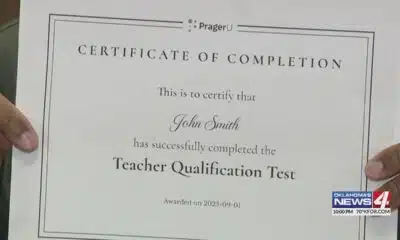News from the South - Louisiana News Feed
Uncertainty swirls around FEMA, NOAA ahead of ‘above-normal’ hurricane season
by Amy Green, Inside Climate News, Louisiana Illuminator
May 26, 2025
This article originally appeared on Inside Climate News, a nonprofit, non-partisan news organization that covers climate, energy and the environment. Sign up for their newsletter here.
Forecasters at the National Oceanic and Atmospheric Administration expect above-average hurricane activity this season.
The federal agency, in its annual outlook released Thursday, predicted 13 to 19 named storms, including six to 10 hurricanes. Of those, it expects three to five major hurricanes of category 3, 4 or 5 strength, packing winds of 111 mph or greater.
The agency said there was a 60% chance of an above-normal season, a 30% chance of a near-normal season and a 10% chance of a below-normal season. The forecast represents an estimate of activity, not number of landfalls.
The average season features 14 named storms, including seven hurricanes and three major hurricanes, according to NOAA. The season begins Sunday, June 1, and ends Nov. 30.
“We’re ready here at NOAA,” said Ken Graham, director of the National Weather Service, during a news briefing held in Gretna, to mark 20 years since Hurricane Katrina. “Are you?”
NOAA based its forecast on a confluence of factors, including warmer than average ocean temperatures, potentially weak wind shear and the possibility of higher activity from the West African Monsoon, a primary starting point for Atlantic hurricanes. Warmer oceans fuel storms with more energy, while weaker winds allow them to develop without disruption.
Forecasters at Colorado State University also anticipate an above-average season, with 17 named storms — including nine hurricanes, four of them major. The forecasters predicted activity would be about 125% of that during an average season between 1991 and 2020.
By comparison, activity in 2024 was about 130% of an average season’s during that time. The 2024 season will be best-remembered for hurricanes Helene and Milton, which together caused more than 250 fatalities and $120 billion in damage across the Southeast.
The Colorado State University forecasters said this season there is a 51% chance of a major hurricane striking the U.S., with a 26% chance of one of the storms making landfall along the East Coast and 33% chance along the Gulf Coast. They predict a 56% chance of a major hurricane tracking through the Caribbean.
The season arrives amid widespread uncertainty over the role the federal government will play in disaster response and recovery, as the Trump administration fires employees, freezes funding and dismantles agencies. NOAA and the Federal Emergency Management Agency are among the targets.
“Uncertainty is not great,” said Phil Klotzbach, a senior research scientist at Colorado State University’s Department of Atmospheric Science. “It just adds another layer of stress. That isn’t great when people are trying to prepare for hurricane season.”
As much as 30 percent of the workforce at NOAA’s National Weather Service has been eliminated, said Rick Spinrad, a former NOAA administrator under the Biden administration. He worried NOAA may struggle to maintain its Hurricane Hunter flights, which he said account for a 15 percent improvement in track and intensity forecasting.
“If you lose that capacity to predict the track, you could either unnecessarily evacuate tens or hundreds of thousands of people, or evacuate the wrong people or not evacuate people who should be evacuated,” he said. “So we are putting lives and property in significant danger with the degradation of the forecast capability.”
No changes to the flights have been proposed, said Michael “Mac” McAlister, who has flown with the Hurricane Hunters for 10 years. This will be the 50th season for one of the two aircraft involved in the program, a WP-3D Orion named Kermit. The other plane is called Miss Piggy.
“There are hardly any 50-year-old pieces of this aircraft left,” McAlister said, referring to Kermit. “The wings get chopped off every five years. In my opinion these are two of the greatest national assets because of the data they provide.”
No one from the National Hurricane Center, a division of the National Weather Service, attended this year’s National Hurricane Conference in New Orleans, said Craig Fugate, a former FEMA administrator under the Obama administration and former director of the Florida Division of Emergency Management.
Normally the National Hurricane Center would brief state and local emergency managers at the conference on new forecasting methods, to help the managers improve communications with the public about, say, when evacuations are necessary. The training is important because there can be high turnover among emergency managers, he said.
“I’m just not aware of any other time that the hurricane center staff wasn’t at that conference,” Fugate said.
NOAA declined to comment on the conference but said Thursday its forecasts would be no less accurate. For instance, the federal agency said the model used to predict hurricanes would undergo an upgrade that would improve track and intensity forecasts by as much as 5 percent.
“We are fully staffed at the Hurricane Center, and we are definitely ready to go,” said Laura Grimm, acting NOAA administrator. “We are really making this a top priority for the administration.”
Kim Doster, the agency’s communications director, added in a statement, “in the near term, NWS has updated the service level standards for its weather forecast offices to manage impacts due to shifting personnel resources. These revised standards reflect the transformation and prioritization of mission-essential operations, while supporting the balance of the operational workload for its workforce. NWS continues to ensure a continuity of service for mission-critical functions.”
Meanwhile, FEMA is in turmoil, with President Donald Trump suggesting he might eliminate the federal agency. Cameron Hamilton, acting head of FEMA, was ousted earlier this month after testifying before a congressional subcommittee that elimination would not be “in the best interest of the American people.” His dismissal coincided with National Hurricane Preparedness Week, declared by Trump in a proclamation in which the president said he remained “steadfastly committed to supporting hurricane recovery efforts and ensuring that Federal resources and tax dollars are allocated to American citizens in need.”
But during Trump’s first week in office he appointed a task force to review FEMA’s ability to respond to disasters. And in March he signed an executive order asserting that federal policy must “recognize that preparedness is most effectively owned and managed at the State, local, and even individual levels.” The order called on state and local governments and individuals to “play a more active and significant role in national resilience and preparedness.”
In April the administration denied a request for assistance from Arkansas Gov. Sarah Huckabee Sanders, a Republican, after tornadoes ripped through several counties there. The administration approved the request in May.
Nonetheless, FEMA told Inside Climate News in a statement, before Hamilton was fired, that its response to disasters would not be diminished.
“Unlike the previous administration’s unprepared, disgraceful and inadequate response to natural disasters like Hurricane Helene, the Trump administration is committed to ensuring Americans affected by emergencies will get the help they need in a quick and efficient manner,” the statement reads. “All operational and readiness requirements will continue to be managed without interruption in close coordination with local and state officials ahead of the 2025 Hurricane Season. Emergency management is best when led by local and state authorities.”
In Florida, Gov. Ron DeSantis welcomed the prospect of more state leadership in disaster response. During an April event in Kissimmee he said he believed the Trump administration would send block-grant funding to states, which could manage the calamities more efficiently.
“We’re not going to be left in the cold. But I can tell you that the FEMA bureaucracy is an impediment to disaster recovery,” said DeSantis, who ran against Trump in the 2024 Republican primary. “We’re nimble. We’re quick. We adjust. So empower the states. Give us the resources, and we don’t necessarily need the federal government to be involved at all.”
But state and local governments already lead the response to disasters, Fugate notes. Governors request federal help only when the scope of the crisis exceeds the state’s capabilities, with the federal government providing little more than funding.
He said it was too soon to guess how all of the developments may affect hurricane season.
Even more cuts could be coming
Trump’s budget request, released earlier this month, would slash more than $1.3 billion from NOAA and $646 million from FEMA. Congress must approve the proposal.
An earlier leaked draft, obtained by Inside Climate News, would abolish NOAA’s research office, called Oceanic and Atmospheric Research or NOAA Research. The office is charged with providing unbiased science to, among other things, improve forecasts and enhance warnings ahead of disasters. The draft included $171 million for the office, down from $485 million in 2024. The few programs that remain, including research into severe storms, would be moved primarily to the National Weather Service and National Ocean Service.
The Trump administration’s 2026 budget passback, as the draft was called, included “significant reductions to education, grants, research, and climate-related programs within NOAA,” according to the document. “Passback levels support a leaner NOAA that focuses on core operational needs, eliminates unnecessary layers of bureaucracy, terminates nonessential grant programs and ends activities that do not warrant a Federal role.”
Project 2025, the conservative strategy for remaking the federal government, calls for NOAA to be taken apart, with many functions eliminated, privatized or moved to other agencies or state and local governments. The document suggests reforming FEMA to shift much of its spending on preparedness and response to state and local governments.
“We’re just providing as accurate information as we can,” said Andy Hazelton, a National Weather Service scientist who was let go earlier this year. “Hopefully we can get back to that, but it’s been a very, very tough environment for the last few months.”
In central Florida, all of the uncertainty has left Alan Harris, the emergency manager in Seminole County, grappling with how to prepare for hurricane season. Seminole is a suburban county north of Orlando that is spliced through by the St. Johns River, Florida’s longest. The county has experienced flooding during several recent hurricanes, including Ian in 2022 and Milton in 2024.
The agency depends on forecasts from the National Weather Service and National Hurricane Center and assistance from FEMA after a storm has passed. It had applied for a grant for a new generator for a special needs shelter under the federal Building Resilient Infrastructure and Communities program, which Trump signed into law in 2020. But the Trump administration ended the program recently.
“We at the local level are going to make sure that our residents are taken care of regardless of what happens at the federal or state level,” Harris said. “We will need help. We just don’t know where that help is going to come from. But I have 100 percent confidence that there will be help whether it’s through mutual aid agreements or it’s from other states or our own state. We’re going to make sure our residents are taken care of.”
YOU MAKE OUR WORK POSSIBLE.
Louisiana Illuminator is part of States Newsroom, a nonprofit news network supported by grants and a coalition of donors as a 501c(3) public charity. Louisiana Illuminator maintains editorial independence. Contact Editor Greg LaRose for questions: info@lailluminator.com.
The post Uncertainty swirls around FEMA, NOAA ahead of ‘above-normal’ hurricane season appeared first on lailluminator.com
Note: The following A.I. based commentary is not part of the original article, reproduced above, but is offered in the hopes that it will promote greater media literacy and critical thinking, by making any potential bias more visible to the reader –Staff Editor.
Political Bias Rating: Center-Left
This article presents a detailed report on NOAA’s hurricane season forecast while highlighting concerns about federal funding cuts and staffing reductions under the Trump administration. The tone is largely factual and informative, but it includes critical context about budget slashes, agency dismantling plans, and personnel losses attributed to conservative policies. It contrasts the Trump administration’s approach with statements from former officials aligned with Democratic administrations, emphasizing risks to disaster preparedness and forecasting capabilities. The framing and emphasis on potential negative impacts of conservative governance suggest a center-left bias, focusing on environmental and public safety implications tied to political decisions.
News from the South - Louisiana News Feed
Lafayette prosecutor Gary Haynes’ federal bribery trial starts
SUMMARY: Gary Haynes, longtime Lafayette Assistant District Attorney, faces federal trial Monday on bribery, kickback, money laundering, and obstruction charges linked to the 15th Judicial District Attorney’s Office pretrial intervention program. Indicted in September, Haynes allegedly steered participants to a vendor in exchange for bribes, including an $81,000 truck. Co-conspirators, all pleading guilty, are expected to testify against him. Evidence includes wiretaps and consensual recordings. Haynes remains on unpaid administrative leave amid scrutiny for rehiring him after a decade-old bribery scandal shuttered the office. The trial poses significant reputational and legal consequences, with Haynes facing up to 60 years if convicted.
The post Lafayette prosecutor Gary Haynes’ federal bribery trial starts appeared first on thecurrentla.com
News from the South - Louisiana News Feed
NBC 10 News Today: LSU female drum major
SUMMARY: The LSU Golden Band from Tigerland is gearing up for an exciting season, highlighted by senior Catherine Mansfield as only the fourth female drum major in the band’s history. With 325 members, the talented group has spent countless hours perfecting their performance, emphasizing precision, passion, and flawless execution. Mansfield feels the pressure but feeds off fan excitement, while Drum Captain Brayden Ibert praises the youthful, skilled group. Associate Director Simon Holoweiko underscores the dedication behind every drill, footwork, and horn note, ensuring the band delivers a powerful, high-energy show that electrifies game day experiences for LSU fans.
The LSU Tiger Band is gearing up for the 2025 season premiere, marking a historic moment as senior drum major Catherine …
News from the South - Louisiana News Feed
Clay Higgins continues his atypical quest for political relevance
by Greg LaRose, Louisiana Illuminator
September 7, 2025
For at least a moment earlier this year, U.S. Rep. Clay Higgins was willing to depart from his typical far-right, far-fetched stances to take a position most would label liberal – on a criminal justice matter, of all things.
Yet just months later, the Lafayette Republican is back to his extremist ways. What’s different now is that he appears rudderless, permanently veering to the right to the point where it could be argued he’s merely spinning in political circles.
Heads turned during the spring session of the Louisiana Legislature when Higgins, a former policeman, gave his support to a proposal that would have let people put in Louisiana prisons by non-unanimous juries seek reviews of their cases. The lawman-turned-lawmaker urged the “swift passage” of the bill by state Sen. Royce Duplessis, D-New Orleans, arguing it preserved the U.S. Constitution’s rights to due process and a fair trial.
“You could not have told me in my 42 years on this earth that I would have a letter from Congressman Clay Higgins supporting a bill that I brought,” Duplessis told colleagues on the Senate floor before they resoundingly rejected the measure. Opponents in the Republican supermajority said the policy change would overload prosecutors and court staff.
In recent days, Higgins has come out firing on all cylinders but with no clear direction ascertainable.
On Aug. 29, he sent a letter to House Speaker Mike Johnson saying that he was stepping down from the House Homeland Security Committee after Rep. Andrew Garabino, R-N.Y., was named its new chairman. Higgins, a candidate for the post, appeared dejected after the vote.
“My Republican colleagues have chosen an alternate path for the Committee that I helped to build,” he wrote to Johnson, “a path more in alignment with the less conservative factions of our Conference, factions whose core principles are quite variant from my own conservative perspective on key issues like amnesty, ICE operations, and opposition to the surveillance state.”
That’s the Higgins we’ve come to know – bitter, self-righteous and steered by conspiracy theories. As he still sits on the House Armed Services and the Oversight and Government Reform committees (chairing the latter’s law enforcement subcommittee), there will be ample chances for him to make bluster’s last stand.
And by no means will Higgins limit himself to those matters. A week ago, he urged the House Appropriations Subcommittee on Labor, Health and Human Services to withhold federal funding from “organizations that push COVID vaccines on young children.”
It followed his pledge on social media to “defund” the New Orleans Health Department for promoting the American Academy of Pediatrics’ guidance on COVID-19 vaccines for children from 6 months to 2 years old.
“State sponsored weakening of the citizenry, absolute injury to our children and calculated decline of fertility,” Higgins wrote in an Aug. 20 X post.
Call me a skeptic, but if there’s a group out there that’s least likely to be anti-fertility, it’s probably pediatricians. It’s not good for their business model.
YOU MAKE OUR WORK POSSIBLE.
Higgins’ latest play for political relevance came Thursday when he joined forces with Rep. James Comer, R-Ky., Oversight and Government Reform chairman, to investigate allegations that pharmacy chain CVS Health used “confidential patient information” to lobby the Louisiana Legislature.
Caremark, a CVS subsidiary, is the prescription benefit manager for the health insurance plan that covers state employees in Louisiana. Attorney General Liz Murrill is suing the company, saying it used information gained through that contract to send text messages to state employees asking them to oppose proposed legislation. The bill in question would have prohibited prescription benefit managers from co-owning pharmacies. Ultimately, lawmakers opted for a less aggressive, transparency measure with the support of independent pharmacies.
Critics consider the co-ownership arrangement self-serving, as the management entities have a direct say in how their affiliated pharmacies price – and profit from – prescription drugs.
Comer and Higgins have requested CVS Health president and CEO David Joyner provide a slate of records to aid in their investigation.
David Whitrap, who handles external relations for CVS, said in an email the company plans to respond to Comer and Higgins. With regards to the text messages, its communication with customers, patients and the community “was consistent with the law,” he said.
As much as he wants to position himself to the far right, Higgins’ involvement in accountability efforts such as this makes him a centrist – at least on this issue. The battle against pharmacy benefit managers is a bipartisan one, with both sides looking to claim the win for bringing down prescription drug and health insurance costs.
Regardless, it’s a welcome moment of lucidity from Higgins, much like Rep. Marjorie Taylor Greene’s demand for the U.S. Department of Justice to produce all its files on Jeffrey Epstein.
No one expects it, but it’s certainly welcomed.
For Higgins, more frequent stances like this could help him emerge from the shadow of Louisiana’s more prominent Republicans in the House – Speaker Johnson, Majority Leader Steve Scalise and Rep. Julia Letlow, a member of the powerful House Appropriations Committee.
But if history portends what lies ahead from Higgins, expect him to once again find his comfort zone on the fringes.
Louisiana Illuminator is part of States Newsroom, a nonprofit news network supported by grants and a coalition of donors as a 501c(3) public charity. Louisiana Illuminator maintains editorial independence. Contact Editor Greg LaRose for questions: info@lailluminator.com.
The post Clay Higgins continues his atypical quest for political relevance appeared first on lailluminator.com
Note: The following A.I. based commentary is not part of the original article, reproduced above, but is offered in the hopes that it will promote greater media literacy and critical thinking, by making any potential bias more visible to the reader –Staff Editor.
Political Bias Rating: Center-Left
The content critiques U.S. Rep. Clay Higgins from a perspective that highlights his far-right positions and labels some of his views as extremist, while also acknowledging occasional bipartisan or centrist actions. The tone is skeptical of conservative stances, particularly on issues like criminal justice, immigration, and COVID-19 vaccines, and it uses language that suggests disapproval of right-wing conspiracy theories. However, it also recognizes moments when Higgins aligns with more moderate or bipartisan efforts, indicating a nuanced but generally center-left leaning viewpoint.
-
Mississippi Today6 days ago
Trump proposed getting rid of FEMA, but his review council seems focused on reforming the agency
-
News from the South - Missouri News Feed7 days ago
Missouri joins dozens of states in eliminating ‘luxury’ tax on diapers, period products
-
News from the South - Tennessee News Feed6 days ago
Tennessee ranks near the top for ICE arrests
-
News from the South - Texas News Feed4 days ago
Texas high school football scores for Thursday, Sept. 4
-
Mississippi Today5 days ago
Brandon residents want answers, guarantees about data center
-
News from the South - Oklahoma News Feed6 days ago
Test taker finds it's impossible to fail 'woke' teacher assessment
-
The Conversation6 days ago
What is AI slop? A technologist explains this new and largely unwelcome form of online content
-
News from the South - Arkansas News Feed6 days ago
Every fall there’s a government shutdown warning. This time it could happen.








































